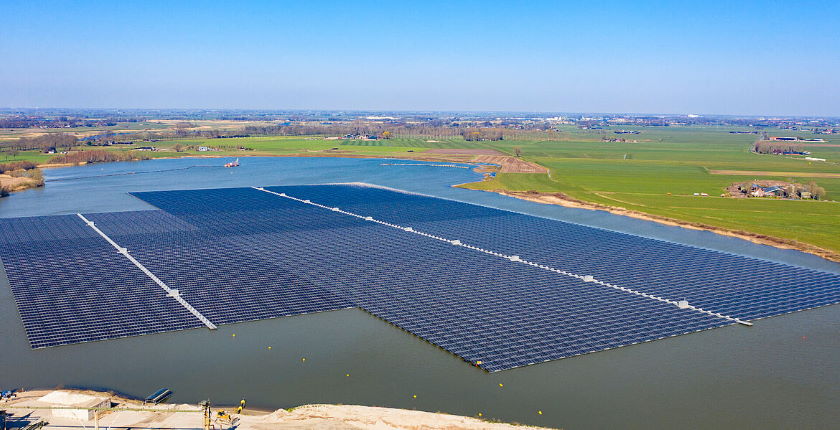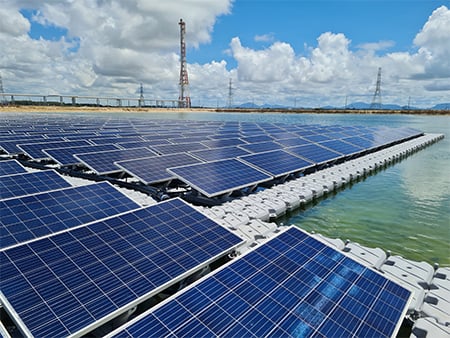Floating Solar System
As the world moves toward a greener future, innovative solutions like floating solar systems are revolutionizing the renewable energy industry. By combining solar technology with underutilized water surfaces, floating solar systems offer a sustainable way to generate clean energy while conserving land and water.
Let’s explore the potential and benefits of this exciting technology.
Download Brochure
Testimonial


FAQs
Where can floating solar systems be installed?
Natural water bodies like lakes.
What are the advantages of floating solar systems compared to land-based systems?
- Land conservation: Utilizes water surfaces, leaving land available for other uses.
- Improved efficiency: Water cooling effect increases solar panel performance.
- Water conservation: Reduces evaporation from reservoirs.
- Eco-friendliness: Avoids land disturbance and supports dual-purpose applications like aquaculture.
Are floating solar systems durable?
Yes, they are designed to withstand harsh weather conditions, including strong winds, rain, and temperature fluctuations. The floating platforms are made of durable, UV-resistant materials like high-density polyethylene (HDPE) that resist corrosion and degradation.
Are floating solar systems more expensive than land-based systems?
- Initial Costs: Floating solar systems typically have higher upfront costs due to the need for specialized floating platforms and mooring systems.
- Long-Term Savings: Improved efficiency, reduced land costs, and lower cleaning requirements can offset the higher initial investment over time.
Do floating solar systems require maintenance?
Yes, but maintenance is minimal:
- Periodic cleaning of solar panels to remove dirt or algae.
- Inspection of the floating structures, mooring systems, and underwater cables for wear and tear.
How do floating solar systems impact the environment?
- Positive impacts: Reduce water evaporation, suppress algae growth, and conserve land
- Potential concerns: Require proper installation to avoid disruption to aquatic ecosystems and ensure minimal impact on water quality.
Can floating solar systems be combined with other renewable energy sources?
- Yes, they can be integrated with hydropower plants to create hybrid systems, utilizing the same water reservoir for both solar and hydroelectric energy generation.
Are floating solar systems suitable for residential use?
- Floating solar systems are typically more suited to commercial and utility-scale projects due to the costs and space required. However, homes near private water bodies can benefit from small-scale installations to offset energy needs.
What is the lifespan of a floating solar system?
- Floating solar systems have a lifespan of 20–25 years, similar to land-based solar installations, provided they are maintained regularly.
Are floating solar systems safe during storms or floods?
- Yes, if properly designed and anchored, floating solar systems can withstand extreme weather conditions. Their mooring and anchoring systems are tailored to local environmental conditions to ensure stability.

What Are Floating Solar Systems?
Floating solar systems, also known as floating photovoltaic (FPV) systems, are solar installations mounted on buoyant platforms that float on water bodies. These systems typically include solar panels, floating structures, mooring systems, and underwater cables to connect with the electrical grid.

How Floating Solar Systems Work: Harnessing the Sun Over Water?
Sunlight Absorption – During the day, sunlight hits the solar panels installed on the floating platform. The photovoltaic cells in the panels absorb photons (light particles) and release electrons, creating an electric current.
Electricity Generation – The electric curre nt generated by the panels is collected and sent through cables to inverters. The inverters convert the current from DC to AC, making it compatible with local energy systems.
Energy Transmission – The electricity is transmitted to a power grid or stored in batteries for later use. If connected to a local facility, the power is directly consumed by the surrounding infrastructure.
Cooling Effect – The water body beneath the solar panels helps cool them, improving their efficiency and extending their lifespan. This cooling effect reduces the heat-related loss of energy that typically affects land-based solar systems.

Benefits Of Solar Rooftop System
Efficient Land Use
Floating solar systems make use of underutilized water surfaces, such as reservoirs, lakes, and ponds, preserving valuable land for agriculture, construction, or other purposes.
Improved Energy Efficiency
The cooling effect of water reduces the temperature of solar panels, increasing their efficiency by 10–15% compared to land-based systems.
Water Conservation
By covering water bodies, floating solar systems reduce evaporation, which is especially beneficial in arid regions or for reservoirs supplying drinking or irrigation water.
Reduced Environmental Impact
Many governments offer subsidies, tax benefits, and net metering policies to encourage solar adoption.Floating solar avoids deforestation or land alteration, minimizing the ecological footprint.
Scalability & Adaptability
These systems can be scaled up for utility-scale projects or adapted for smaller installations, offering flexibility for various energy needs.
Dual Purpose Usage
Floating solar farms can integrate with other activities like aquaculture, allowing fish farming alongside energy generation for maximum resource utilization.
Types of Floating Solar Systems

Fixed Floating Solar Systems
Ideal for water bodies where the sun’s angle remains relatively consistent throughout the day, and where low maintenance or simplicity is a priority.

Single-Axis Tracking Floating Solar Systems
The solar panels are mounted on floating structures that can rotate along a single axis (typically from east to west). This allows them to follow the sun's movement, optimizing energy capture.

Modular Floating
These systems use modular floating platforms that can be easily expanded or reconfigured based on energy needs. The modular design offers flexibility in both installation and future growth.
Steps to Install a Floating Solar System
Site Assessment
A professional evaluates your rooftop's suitability for solar panels, considering factors like sunlight availability, roof orientation, and space.
Design & Planning
Based on your energy requirements, experts design a system tailored to your needs.
Solar Panel Installation
Panels, inverters, and other components are installed on your roof, followed by wiring and grid connection
Maintenance & Monitoring
Solar systems require minimal maintenance. Regular cleaning and periodic checks ensure optimal performance.
Why Choose Floating Solar Systems for Your Home or Business?
Thangam Energy Solutions Private Limited specializes in customized floating solar solutions to meet residential and commercial energy needs. Get in touch with us today to explore how floating solar can power your home or business efficiently and sustainably!

Floating solar systems are emerging as a revolutionary way to generate clean energy while optimizing the use of available resources. Whether for residential or commercial purposes, these systems offer several compelling reasons to make the switch.
Choosing floating solar systems for your home or business is more than just an energy decision—it’s a step toward a sustainable future. These systems not only help reduce energy costs but also make a significant positive impact on the environment.
Fulfilling the dreams of every house owner to move towards sustainable energy
